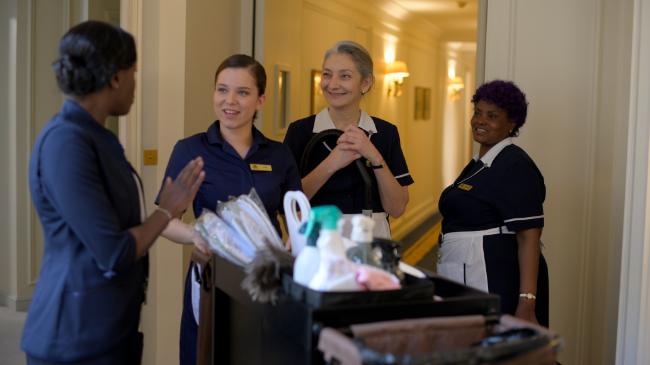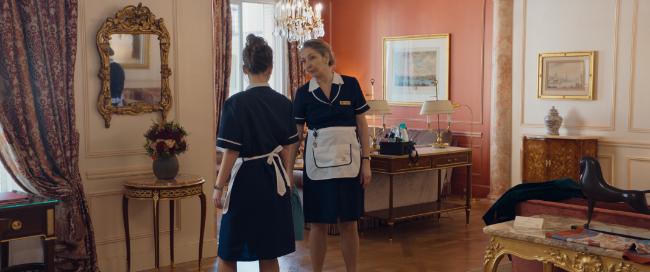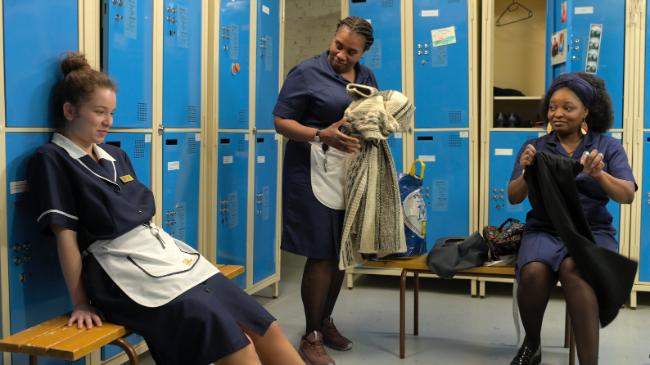Film Review: Petites Mains (Striking the Palace)
- SUBSCRIBE
- ALREADY SUBSCRIBED?
BECOME A BONJOUR PARIS MEMBER
Gain full access to our collection of over 5,000 articles and bring the City of Light into your life. Just 60 USD per year.
Find out why you should become a member here.
Sign in
Fill in your credentials below.
It may seem ironic for a director of immigrant stock to make a traditional, even primordial kind of French movie like Petites Mains (Striking the Palace). Or maybe not so ironic. Petites Mains (literally “little hands” — basically “the help”) is about the people doing manual labor of the type now labelled “immigrant work”. Here it’s the maintenance staff in a five-star luxury hotel called a palace. But hard physical work still remains, while we’re not yet totally robotized and AI’d, the heart of a nation’s soul. Director Nessim Chikhaoui pulls out the stops on this film social, and the result can sometimes be moralistic, corny, and sentimental, but it works. Wonderfully.
The controlling story arc involves, unsurprisingly, a strike. The employees are not striking for vague demands, as sometimes seems the case in France, or for more money and benefits. The workers want to be recognized as workers — to be “internalized”, and not considered as human fodder supplied by anonymous outsourcing companies. On another level, it’s about the employees simply wanting hotel management to talk to them, even if it’s to disagree. The movie resembles Norma Rae, Martin Ritt’s film (with Sally Field) about unionizing a textile plant in the American South. Aside from that film, Hollywood social films (think Nomadland) tend to be fuzzy. French artists (think Zola’s J’Accuse) can be devastatingly direct.
At the same time, in not only depicting the plight of the have-nots but trying to appeal to the masses as an audience, such filmmakers are often shameless in providing low-brow entertainment. This is not the middle-class social cinema of Robert Guédiguian or the Dardennes brothers (or Ken Loach in the UK), whose sympathetic, humanistic approach sometimes feels a bit distanced and resigned.

Petites Mains.. Michael Crotto – Albertine Productions – Prima Vista Films
And so Petites Mains features a plucky young woman, Eva (Lucie Charles-Alfred), who’s had a rough time of it and starts her professional life working at the hotel. It’s partially a device to show, as an older woman teaches her the ropes, the ins-and-outs of how the employees work: paid by the room, strict deadlines, rules about how to look (a woman who’s dyed her hair green is forced to don a wig). Eva, needless to say, meets a handsome young guy (Abdallah Charki) also working at l’Aston, and we follow their rather hoked-up romance.
The older woman, Simone (marvelously played by a crusty Corinne Masiero), suffers from a leg problem and is being pushed towards retirement. Cheap labor comes at a steep physical cost: Another employee has also suffered a debilitating injury, and a burnt-out employee whose husband seems to be unemployed must deal with him and her brood of kids on one hand, her desire to join the strike on the other. Fortunately the social soap opera is mixed with heaps of comedy both physical and verbal, as well as numerous feel-good moments.
Ms. Charles-Alfred is a very talented young actress with the slightly pudgy good looks of Adele Exarchopoulos or Scarlett Johansson, but with a more vulnerable presence. Her character can show flashes of anger, desperation, determination, coquettishness. She’s an old-fashioned “trouper” who if she could sing could be compared to Selena Gomez or a young Barbra Streisand (her version of an African dance isn’t too bad). Our sympathetic side identifies with her, our experienced side with the hard-nosed get-on-with-it attitude of Simone (with her dollops of exasperation but also concern for others).

Petites Mains. Albertine Productions – Prima Vista Films
If Eva and Simone are the main focus of Petites Mains, it’s also a film in another genre the French do so well: the ensemble comedy. There are nearly a dozen distinct characters we laugh at and empathize with, in particular those played by Marie-Sohna Condé, Salimata Kamaté, Maimouna Gueye, and Fatima Adoum. Most of them are women of a certain age, of African or other minority descent. Instead of cuddly caricatures we see hard-working people competent at their jobs, strong-willed, with a sense of humor, protective of their livelihoods and yet human with each other (and even with their less-than-lovable managers). The director is expert in seamlessly moving from one character (or cluster of characters) to another, until we eventually feel as if we’ve spent a Netflix season getting to know them.
It must be said, though, that the director, himself of immigrant origin, also plays by old-school racial codes: The two leads are white (Eva is supposed to be partly Antillais, but that’s little more than an additional laugh in this comic film), and the leader of the union revolt is white and male. On the other hand, the strongest performance is by Mariama Gueye as Agnès, a middle-management “baddie” who stays firmly planted on the very fine line between harshness and a modicum of fair-play. In the end sheer quantity affects quality: we get a sense of a multi-ethnic society with a good deal of fraternité but lacking on the égalité side. Yet our intrepid workforce manages to pull off a deliciously comic coup de théâtre in their protest movement, with (some) positive results.
Something striking about Petites Mains is the way it overtly displays the colors and logo of a real labor union active on behalf of such employees: the leftist CGT, which at one time was linked with the French Communist Party, and is still France’s most powerful union, albeit more in the public sector. The end credits show clips of real-life activists during a similar strike action several years ago, as well as a leftist member of the National Assembly who may have come from that milieu. So the loveable social comedy winds up delivering a good dose of agit-prop. The agitation and propaganda might not convert you, but will arouse your sensitivity and make you ask questions, like: The young man who dutifully came in to clean the screening room as soon as the film ended — was he “internalized”, unionized, what have you … or not?
Production: Le Pacte/Albertine Productions
Distribution: Le Pacte
Lead photo credit : Petites Mains.. Michael Crotto - Albertine Productions - Prima Vista Films
More in cinema, film review




